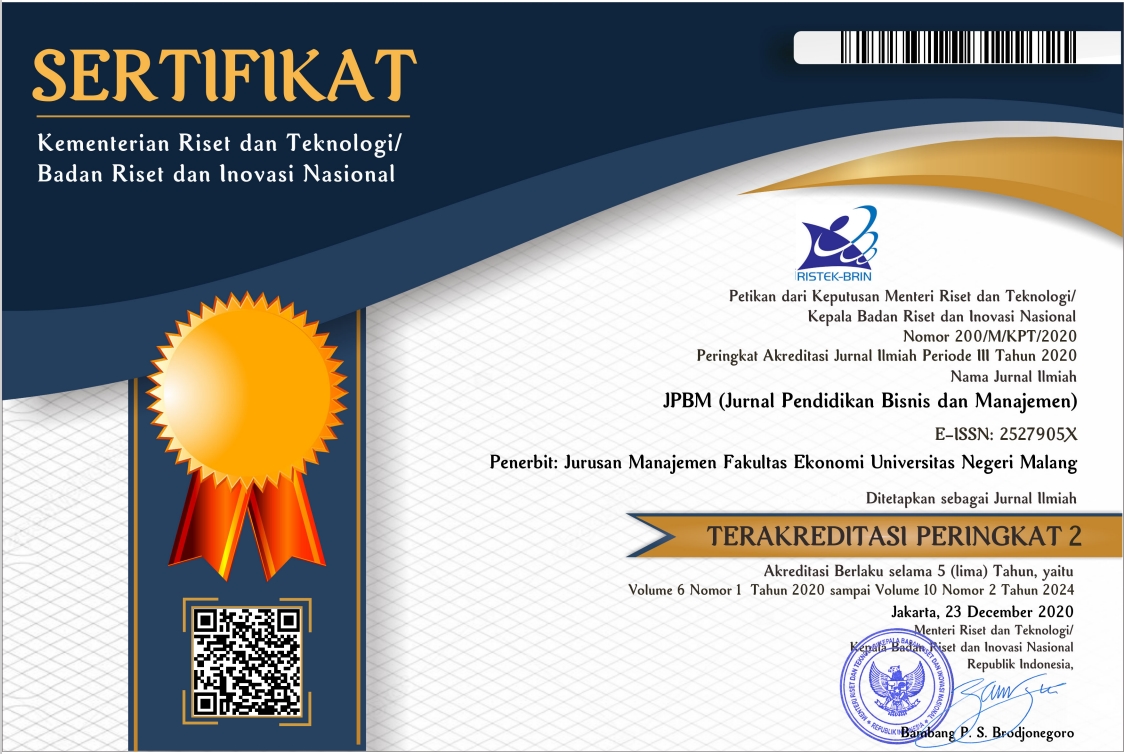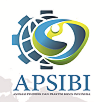Improving SMEs Production Performance through Local Brand and Augmented Reality: Evidence from Sumatera of Indonesia
Abstract
This research aims to discuss the performance relationships of small-medium enterprise production mediated by local brand empowerment as well as investigates the role of technology adaptation of livelihood activities, fast-moving enterprise, and government policy support. This study involved 115 micro small business activists and medium respondents in the Sumatran region. A compound path test of SEM-PLS is used in this study to obtain data from the analysis of the path mediated by local brand empowerment, augmented reality preference, and acceptance of adaptive technology moderation for production performance enhancement. The findings indicate that fast-moving enterprise and government policy have a positive impact, while livelihood activities negatively impact local brand empowerment, and local brand empowerment negatively correlates to production performance. The direct stimulus of livelihood activities is meaningless, but government policy support is meaningful to the increased production of SMEs. The contribution of this study is found in the conceptual model of the acceptance of technological adaptation and optimization capabilities of the use of augmented local brand applications empowerment to increase the production of small and medium enterprises.
Keywords: Augmented Reality, Local Brand empowerment, Government Support, Product Performance
Keywords
Full Text:
PDFReferences
Acs, Z. J., Audretsch, D. B., & Lehmann, E. E. (2013). The knowledge spillover theory of entrepreneurship. Small Business Economics, 41(4), 757–774. https://doi.org/10.1007/s11187-013-9505-9
Al-Aali, A., & Teece, D. J. (2014). International entrepreneurship and the theory of the (long-lived) international firm: A capabilities perspective. Entrepreneurship: Theory and Practice, 38(1), 95–116. https://doi.org/10.1111/etap.12077
Alvarez, S. A., & Busenitz, L. W. (2007). The entrepreneurship of resource-based theory. In Entrepreneurship: Concepts, Theory and Perspective (pp. 207–227). https://doi.org/10.1007/978-3-540-48543-8_10
Amit, R., & Zott, C. (2001). Value creation in e-business. Strategic Management Journal, 22(6–7), 493–520. https://doi.org/10.1002/smj.187
Aragón-Correa, J. A., Hurtado-Torres, N., Sharma, S., & García-Morales, V. J. (2008). Environmental strategy and performance in small firms: A resource-based perspective. Journal of Environmental Management, 86(1), 88–103. https://doi.org/10.1016/j.jenvman.2006.11.022
Austin, J., Stevenson, H., & Wei-Skillern, J. (2006). Social and commercial entrepreneurship: Same, different, or both? Entrepreneurship: Theory and Practice, 30(1), 1–22. https://doi.org/10.1111/j.1540-6520.2006.00107.x
Baños-Caballero, S., García-Teruel, P. J., & Martínez-Solano, P. (2010). Working capital management in SMEs. Accounting and Finance, 50(3), 511–527. https://doi.org/10.1111/j.1467-629X.2009.00331.x
Batra, R., Ramaswamy, V., Alden, D. L., Steenkamp, J. B. E. M., & Ramachander, S. (2000). Effects of brand local and nonlocal origin on consumer attitudes in developing countries. Journal of Consumer Psychology, 9(2), 83–95. https://doi.org/10.1207/s15327663jcp0902_3
Beaudry, A., & Pinsonneault, A. (2005). Understanding user responses to information technology: A coping model of user adaptation. MIS Quarterly: Management Information Systems, 29(3), 493–524. https://doi.org/10.2307/25148693
Beaudry, A., & Pinsonneault, A. (2010). The other side of acceptance: Studying the direct and indirect effects of emotions on information technology use. MIS Quarterly: Management Information Systems, 34(4), 689–710. https://doi.org/10.2307/25750701
Bolesnikov, M., Stijačić, M. P., Radišić, M., Takači, A., Borocki, J., Bolesnikov, D., Bajdor, P., & Dzieńdziora, J. (2019). Development of a business model by introducing sustainable and tailor-made value proposition for SME clients. Sustainability (Switzerland), 11(4). https://doi.org/10.3390/su11041157
Buhalis, D., & Sinarta, Y. (2019). Real-time co-creation and nowness service: lessons from tourism and hospitality. Journal of Travel and Tourism Marketing, 36(5), 563–582. https://doi.org/10.1080/10548408.2019.1592059
Bystrom, K. E., Barfield, W., & Hendrix, C. (1999). A conceptual model of the sense of presence in virtual environments. In Presence: Teleoperators and Virtual Environments (Vol. 8, Issue 2, pp. 241–244). https://doi.org/10.1162/105474699566107
Chambers, R., & Conway, G. R. (1992a). Sustainable rural livelihoods: practical concepts for the 21st century. IDS Discussion Paper, 296.
Chambers, R., & Conway, G. R. (1992b). Sustainable rural livelihoods: practical concepts for the 21st century. In IDS Discussion Paper (Vol. 296). Institute of Development Studies (UK).
Chaston, I., Badger, B., & Sadler-Smith, E. (1999). Organisational learning: Research issues and application in SME sector firms. International Journal of Entrepreneurial Behaviour & Research, 5(4), 191–203. https://doi.org/10.1108/13552559910293146
Doh, S., & Kim, B. (2014). Government support for SME innovations in the regional industries: The case of government financial support program in South Korea. Research Policy, 43(9), 1557–1569. https://doi.org/10.1016/j.respol.2014.05.001
Dyer, J. H., Gregersen, H. B., & Christensen, C. (2008). Entrepreneur behaviors, opportunity recognition, and the origins of innovative ventures. Strategic Entrepreneurship Journal, 2(4), 317–338. https://doi.org/10.1002/sej.59
Fornes, G., Cardoza, G., & Xu, S. (2012). The national and international expansion of Chinese SMEs: evidence from Anhui Province. Journal of Chinese Entrepreneurship, 4(3), 221–242. https://doi.org/10.1108/17561391211262166
Fowosire, R. A., Elijah, O., & Fowosire, R. (2017). Technopreneurship: A View of Technology, Innovations and Entrepreneurship. Type: Double Blind Peer Reviewed International Research Journal Publisher: Global Journals Inc, 17(7).
García-Teruel, P. J., & Martínez-Solano, P. (2007). Effects of working capital management on SME profitability. International Journal of Managerial Finance, 3(2), 164–177. https://doi.org/10.1108/17439130710738718
Hadiyati, E. (2015). Marketing and government policy on MSMEs in Indonesian: A Theoretical Framework and Empirical Study. International Journal of Business and Management, 10(2). https://doi.org/10.5539/ijbm.v10n2p128
Hair, J. F., Ringle, C. M., & Sarstedt, M. (2011). PLS-SEM: Indeed a silver bullet. Journal of Marketing Theory and Practice, 19(2), 139–152. https://doi.org/10.2753/MTP1069-6679190202
Hayton, J. C. (2003). Strategic human capital management in SMEs: An empirical study of entrepreneurial performance. Human Resource Management, 42(4), 375–391. https://doi.org/10.1002/hrm.10096
Henseler, J., Ringle, C. M., & Sinkovics, R. R. (2009). The use of partial least squares path modeling in international marketing. Advances in International Marketing, 20, 277–319. https://doi.org/10.1108/S1474-7979(2009)0000020014
Hill, J., Nancarrow, C., & Tiu Wright, L. (2002). Lifecycles and crisis points in SMEs: a case approach. Marketing Intelligence & Planning, 20(6), 361–369. https://doi.org/10.1108/02634500210445419
Hitt, M. A., Ireland, R. D., Camp, S. M., & Sexton, D. L. (2001). Strategic entrepreneurship: entrepreneurial strategies for wealth creation. Strategic Management Journal, 22(6–7), 479–491. https://doi.org/10.1002/smj.196
Howell, T. R., Noellert, W. A., MacLaughlin, J. H., & Wolff, A. W. (2019). The microelectronics race: The impact of government policy on international competition. In The Microelectronics Race: The Impact of Government Policy on International Competition. books.google.com. https://doi.org/10.4324/9780429312625
Hudson, M., Smart, A., & Bourne, M. (2001). Theory and practice in SME performance measurement systems. International Journal of Operations and Production Management, 21(8), 1096–1115. https://doi.org/10.1108/EUM0000000005587
Luan, J., Shan, W., Wang, Y., & Xiao, J. (2019). How easy-to-process information influences consumers over time: Online review vs. brand popularity. Computers in Human Behavior, 97, 193–201. https://doi.org/10.1016/j.chb.2019.03.028
Mair, J., Robinson, J., & Hockerts, K. (2006). Social entrepreneurship. In Social Entrepreneurship. https://doi.org/10.1057/9780230625655
McCreery, M. P., Schrader, P. G., Krach, S. K., & Boone, R. (2013). A sense of self: The role of presence in virtual environments. Computers in Human Behavior, 29(4), 1635–1640. https://doi.org/10.1016/j.chb.2013.02.002
Mishra, C. S., & Zachary, R. K. (2015). The theory of entrepreneurship. In Entrepreneurship Research Journal (Vol. 5, Issue 4, pp. 251–268). https://doi.org/10.1515/erj-2015-0042
Mizrahi, S. (2017). Performance Management, Managerial Quality, and Government Performance: A Cross-Country Quantitative Analysis. Public Policy and Performance Management in Democratic Systems, 65–97. https://doi.org/10.1007/978-3-319-52350-7_4
Mueller, B. H., Lee, J. J.-Y. J. K. J.-S. J. J., Guest, G., MacQueen, K. M., Namey, E. E., Hair Jr, J. F., Sarstedt, M., Ringle, C. M., Bossuyt, S., Van Kenhove, P., Arnaud, A., Horta, H., Santos, J. M., Ponzi, L. J., Fombrun, C. J., Gardberg, N. A., Vakola, M., Bouradas, D., Ryan, G. W., … Akter, S. (2016). Australian community attitudes to privacy survey 2017. Computers in Human Behavior. https://doi.org/10.1145/272287.272299
Nguyen, Q. A., Sullivan Mort, G., & D’Souza, C. (2015). Vietnam in transition: SMEs and the necessitating environment for entrepreneurship development. Entrepreneurship and Regional Development, 27(3–4), 154–180. https://doi.org/10.1080/08985626.2015.1015457
Nowak, K. L., & Biocca, F. (2003). The Effect of the agency and anthropomorphism on users’ sense of telepresence, copresence, and social presence in virtual environments. Presence: Teleoperators and Virtual Environments, 12(5), 481–494. https://doi.org/10.1162/105474603322761289
Ogunyomi, P., & Bruning, N. S. (2016). Human resource management and organizational performance of small and medium enterprises (SMEs) in Nigeria. International Journal of Human Resource Management, 27(6), 612–634. https://doi.org/10.1080/09585192.2015.1033640
Onkelinx, J., Manolova, T. S., & Edelman, L. F. (2016). Human capital and SME internationalization: Empirical evidence from Belgium. International Small Business Journal: Researching Entrepreneurship, 34(6), 818–837. https://doi.org/10.1177/0266242615591856
Pais, M. A., & Gama, P. M. (2015). Working capital management and SMEs profitability: Portuguese evidence. International Journal of Managerial Finance, 11(3), 341–358. https://doi.org/10.1108/IJMF-11-2014-0170
Pascoal, R., Alturas, B., De Almeida, A., & Sofia, R. (2018). A survey of augmented reality: Making technology acceptable in outdoor environments. Iberian Conference on Information Systems and Technologies, CISTI, 2018-June, 1–6. https://doi.org/10.23919/CISTI.2018.8399155
Rahman, M. S., & Mannan, M. (2018). Consumer online purchase behavior of local fashion clothing brands. Journal of Fashion Marketing and Management: An International Journal. https://doi.org/10.1108/jfmm-11-2017-0118
Robinson, L., Marshall, G. W., & Stamps, M. B. (2005). An empirical investigation of technology acceptance in a field sales force setting. Industrial Marketing Management, 34(4 SPEC ISS.), 407–415.
Samah, A. A., & Shaffril, H. A. M. (2018). Sustainable livelihood for a better Adaptation towards Climate Change among Small Scale Fishermen in Malaysia. International Journal of Academic Research in Business and Social Sciences, 8(1). https://doi.org/10.6007/ijarbss/v8-i1/3817
Scoones, I. (1998). Sustainable rural livelihoods: a framework for analysis. IDS Working Paper, 72, 22. http://forum.ctv.gu.se/learnloop/resources/files/3902/scoones_1998_wp721.pdf
Selladurai, M. (2016). Conceptual framework on technopreneurship. SELP Journal of Social Science, VII(27), 92–97.
Sheehan, M. (2014). Human resource management and performance: Evidence from small and medium-sized firms. International Small Business Journal, 32(5), 545–570. https://doi.org/10.1177/0266242612465454
Sinarta, Y., & Buhalis, D. (2018). Technology Empowered Real-Time Service. In Information and Communication Technologies in Tourism 2018 (pp. 283–295).
Slater, M., Gonzalez-Liencres, C., Haggard, P., Vinkers, C., Gregory-Clarke, R., Jelley, S., Watson, Z., Breen, G., Schwarz, R., Steptoe, W., Szostak, D., Halan, S., Fox, D., & Silver, J. (2020). The Ethics of Realism in Virtual and Augmented Reality. Frontiers in Virtual Reality, 1. https://doi.org/10.3389/frvir.2020.00001
Steenkamp, J. B. E. M., & Baumgartner, H. (1998). Assessing measurement invariance in cross-national consumer research. Journal of Consumer Research, 25(1), 78–90. https://doi.org/10.1086/209528
Tang, Y., Wang, P., & Zhang, Y. (2007). Marketing and business performance of construction SMEs in China. Journal of Business and Industrial Marketing, 22(2), 118–125. https://doi.org/10.1108/08858620710730230
Technology for Adaptive Aging. (2004). In Technology for Adaptive Aging. https://doi.org/10.17226/10857
Uchehara, D. F. O. (2017). Effect of Micro, Small and Medium Enterprises MSMEs in Sustainable Rural Development in Nigeria. International Journal of Trend in Scientific Research and Development, Volume-1(Issue-6), 622–634.
Witmer, B. G., & Singer, M. J. (1998). Measuring presence in virtual environments: A presence questionnaire. Presence: Teleoperators and Virtual Environments, 7(3), 225–240. https://doi.org/10.1162/105474698565686
Zada, M., Shah, S. J., Yukun, C., Rauf, T., Khan, N., & Shah, S. A. A. (2019). Impact of small-to-medium size forest enterprises on rural livelihood: Evidence from Khyber-Pakhtunkhwa, Pakistan. Sustainability (Switzerland), 11(10). https://doi.org/10.3390/su11102989
Zanuddin, H., & Mukhtar, N. (2019). Local product brand image: A case study of small and medium enterprises in Muar, Johor. International Journal of Supply Chain Management, 8(1), 183–187.
Refbacks
- There are currently no refbacks.
JPBM (Jurnal Pendidikan dan Bisnis Manajemen) is licensed under a Creative Commons Attribution-NonCommercial-ShareAlike 4.0 International License.
JPBM (Jurnal Pendidikan dan Bisnis Manajemen) is abstracted and indexed in :

















